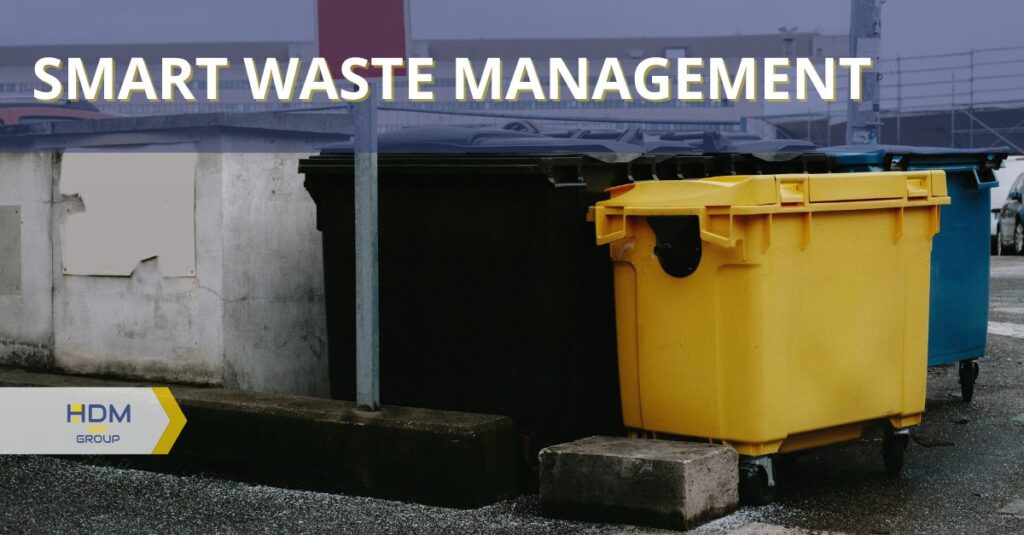Smart waste management: what it is and what its potential

What is it?
The increase in population and consumption has generated an incredible amount of waste, challenging traditional management methods.
However, there is one solution that is emerging: Smart Waste Management.
This innovative approach uses the power of technology to handle waste issues in an efficient and ecologically sustainable way.
The world is increasingly moving towards the use of smart technologies to improve quality of life and reduce environmental impact. In this context, Smart Waste Management, represents one of the most innovative solutions to solve the waste problem.
Smart Waste Management, or intelligent waste management, is a set of technologies and tools to monitor, manage and remove waste in a more efficient and sustainable way.
Using advanced sensors and software, companies can monitor the flow of waste in real time, improve route management of collection vehicles, reduce costs and minimise environmental impact.
Features and potential
The potentials of Smart Waste Management are many. Just think of the sensors that can be installed on bins to remotely monitor the amount of waste collected and plan collection more efficiently, thus preventing bins from being emptied unnecessarily or filling up too quickly.
In this way, costs related to waste collection and transport can be reduced and the efficiency of operations improved.
Furthermore, the data collected by the sensors can be used to analyse production patterns and identify areas where action is needed to improve waste sorting and reduce the production of non-recyclable waste.
But Smart Waste Management is not only about collecting waste from single bins. Smart technologies can also be used for landfill management and monitoring of pollutant emissions.
Companies that implement smart waste management technologies can benefit from a number of advantages:
- they can improve the efficiency of their operations and reduce the costs associated with waste management;
- they can improve their environmental reputation by demonstrating their commitment to sustainability;
- they can contribute to environmental protection by reducing the impact of waste on the environment and on people’s health.
This type of technology can optimise not only the management of recycling bins, but of all types of bins, including those for waste oil and used clothing collection. Moreover, it is applicable to both traditional collection by robot vehicles and door-to-door collection.
Benefits
Smart waste management is an important part of the development of smart cities (along with water, energy and traffic management), which are increasingly widespread in all areas to the extent that they support the growth of a large market.
According to the World Bank, we are facing an exponential growth of this market, due to the rapid urbanisation and industrialisation of territories, with an increasingly growing demand for efficient waste management, which often reaches 20-50% of municipal budgets.
By deploying sensors, network infrastructure and data visualisation platforms, waste management companies are therefore able to generate useful information for municipalities, which in some cases, recorded in the United States, United Arab Emirates and the United Kingdom in collaboration with innovative waste management companies, save 30% of waste collection costs.
So how can we summarise the benefits that Smart Waste Management brings?
- Reduced costs: the entire process can be optimised, reducing the costs of waste collection, disposal and management.
- Improved efficiency: sensors and monitoring systems make it possible to collect real-time data on waste production, improving the efficiency of collection and management.
- Improved environmental sustainability: the environmental impact of waste can be reduced, e.g. by recycling and reducing non-recyclable waste.
- Improved user experience: technologies such as smartphone apps or waste reporting systems allow users to report problems and improve the experience of those using the waste collection service.
- Improved safety: the use of advanced technologies allows waste to be safely monitored and managed, reducing the risk of waste management incidents.
HDM Group and SWM
Recognising the ever-increasing importance of intelligent waste management, not only to reduce environmental impact, but also to improve efficiency and reduce the costs of waste management operations, we have partnered with Sensoneo, a leading specialist in intelligent waste management technology, to provide world-class monitoring solutions.
Thanks to their expertise and innovation, Sensoneo helps us provide the most advanced and reliable waste management solutions, increasing efficiency and minimising environmental impact.
We have also developed, in cooperation with one of our partners, a ‘smart’ lock for bins, specially designed to open and close them using NFC or RFID cards.
The Smart Lock Bin Handler consists of an ad-hoc customised electronic card that provides remote access and management of the bin itself.
It is also possible to connect the Smart Lock Bin Handler to a LoRa node and can be integrated with other sensors to provide additional information and functionality: these can detect, for example, if the bin has been opened in an unauthorised manner.
Smart Waste Management represents an innovative and sustainable solution for waste management.
We can therefore say that implementing a SWM system is a winning choice for companies that want to make a difference to the environment and society.

